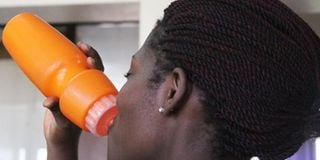Prime
Government Wants Health Warnings on Soft Drinks

Do you know what you’re drinking? Starting next month, manufacturers will be required to put health warnings on their products. PHOTO BY Ismail Kezaala
What you need to know:
On April 1, imitation drinks will be forced to comply with labelling standards since companies producing real fruit juices had filed complaints against the imitation drinks taking over the industry.
You have seen them before. Claims of fresh fruit, vitamins and supplements in a juice – which after you drink it, tastes sweet and sugary instead. The taste is nothing like that of the mango or pineapple you see on the colorful and inviting label. Nor does it help you to distinguish what makes one drink “herbal” over another, or what is different from one energy drink to the next.
These types of imitation drinks on shop shelves and taxi parks around the country will be forced to fall in line with East African Community (EAC) standards by April 1 this year, to tell the consumer exactly what they’re drinking. As the regional market aims to increase free movement of goods, labour, services and capital to ultimately boost trade and investment across the region, it has also forced a closer look at existing regulation and standards.
Though Uganda has already had its own guidelines in place since 2004, Winnie Atugonza in the surveillance division at the Uganda National Bureau of Standards (UNBS) says the standards have not actually changed from what they had written down eight years ago. Rather, it was a matter of implementing them.
“It wasn’t enforced then because the industries were still few that were dealing in imitation drinks. However, they have now increased in number. So we really need to regulate what goes on the market for consumption,” she said.
Ms Atugonza says the companies producing real fruit juices had filed complaints against the imitation drinks taking over the industry, and they had cause to complain.
“The prices for the fruit juice are the same as those of the imitation drinks or even higher,” she explains. “The fruit juice producers weren’t getting value for their money.”
Samuel Balagadde, the manager of imports inspection at UNBS says, this time the bureau will crack down on any imitation drink found on the market. Companies have been warned that according to the standard, any imitation drink discovered will be destroyed and won’t find their way to the market again. “The EAC wants the labelling of the imitation drinks not to be deceptive. We also need to protect our consumers,” Mr Balagadde said.
Though he adds that UNBS has received few direct complaints from consumers about immediate health complications due to the drinks, one health professional says it is the long-term impacts that Ugandans should be looking at.
An unhealthy lifestyle
According to Dr Vincent Karuhanga, a general physician with Friends PolyClinic in Kampala, too many Ugandans are already taking too much of a fake thing.
The imitation drinks could be causing health problems due to their main ingredients: high sugar levels, too much vitamin C, artificial flavours and preservatives.
The artificial sugars are dangerous because when taken in excess, they may lead to obesity, while large amounts of Vitamin C can cause stomach upsets and peptic ulcers.
The high intake of these types of drinks are emblematic of an “eat first, ask later” lifestyle that has led to the incidence of diabetes and high blood pressure reaching “epidemic proportions”, Dr Karuhanga says.
The luxurious lifestyle that energy drinks have come to be associated with are also questionable, the doctor says. He calls drinks such as Red Bull a “drink of the rich” – which people often drink in excess, or mix with alcohol. Though that particular energy drink has been banned in some European countries, people here are unaware of the health risks it may pose.
Though athletes are a group that might want this drink for the energy for instance, it often does more harm that good. It can put an athlete especially at undue risk as the drink dehydrates at the same time the physical activity is. The drink also speeds up one’s heart rate due to the high caffeine levels and the stimulant taurine are dangerous especially if you already have heart problems, diabetes, unstable liver and kidney conditions or high blood pressure.
Loopholes
Dr Karuhanga says even the amount of ingredients in a drink can be unreliable. “It depends on if the man running the machine is happy or not,” he said. But UNBS insists testing of the product’s contents will no longer let ingredients slip through the cracks.
Among the ingredients that are mentioned on imitation drink labeling is that they offer vitamins and supplements. Dr Karuhanga says consumers are lured into thinking that they will get the vitamins that they are lacking, while imitation drinks producers have then abused tax loopholes which allow them to make more of a profit, as supplements are taxed while drugs are not. So supplements also end up flooding the market as they can be sold off cheaply.
Mr Balagadde defends by saying sometimes it’s hard to tell the difference as, “There is a very thin line between drugs and supplements. For example, you have vitamin C as a food supplement and also as a drug, so that one is hard for authorities to come up with proper assessments.
But Mr Balagadde that with regulation, these loopholes will be no longer. And while imitation drinks will stay, with labeling comes a more informed consumer. “We want the consumers to make a choice, but know what they are taking,” he says.




